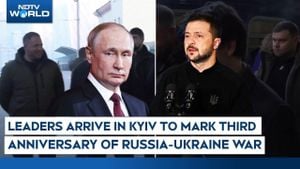The leaders of the European Union arrived in Kyiv on Monday, February 24, to demonstrate their unwavering support for Ukraine on the third anniversary of Russia’s invasion. Their visit, characterized as both symbolic and substantive, marks the EU's commitment to Ukraine's sovereignty at a time when the future of the country is closely linked to the broader security of Europe.
European Commission President Ursula von der Leyen underscored this message through her social media platforms, declaring, "Ukraine is part of Europe and its struggle for survival is not only about its own fate; it is also about the future of the continent." Von der Leyen, traveling by train alongside European Council President António Costa, shared her experiences of the trip, capturing the importance of EU solidarity with Ukraine.
Addressing the gravity of the moment, von der Leyen emphasized, "On the 3rd anniversary of Russia’s brutal invasion, Europe is in Kyiv. We are here today because Ukraine is Europe. This fight is not only about the destiny of Ukraine; it's about Europe’s destiny as well." Her statements echo the sentiment held by many EU leaders, who view Ukraine's struggle as integral to the stability and security of all European nations.
President Volodymyr Zelensky also took the opportunity to reflect on the past three years, remarking on the resilience and valor of the Ukrainian people. “Three years of resistance. Three years of gratitude. Three years of absolute heroism from the Ukrainians. I am proud of Ukraine!” Zelensky expressed through his social media channels. His message serves not only as recognition of the sacrifices made by his fellow citizens but as gratitude to everyone who defends and supports Ukraine.
While the anniversary of the invasion loomed, the EU leaders convened to deliberate future actions. Costa announced the summoning of an emergency European Council meeting scheduled for March 6, 2025, emphasizing the need for urgent discussions covering developments within Ukraine and the overarching European security framework. He affirmed, “This moment is critically important for both Ukraine and Europe’s security, and we must reinforce our defense and find effective ways to contribute to lasting peace on the continent.”
Members of the EU have reaffirmed their commitment to not only provide military assistance to Ukraine but also to work collaboratively to deliver humanitarian aid to those impacted by the conflict. European countries have opened their borders and extended resources to support Ukrainian refugees, reflecting the EU’s broader humanitarian response to the war.
Despite the backdrop of conflict, the atmosphere during the EU leaders' visit remained hopeful. Senior EU officials reiterate their willingness to implement significant financial support packages aimed at helping rebuild Ukraine’s economy and infrastructure once the conflict concludes, demonstrating long-term intentions beyond immediate military assistance.
Simultaneously, the timing of this high-profile visit coincided with troubling news from Russia. Ukrainian authorities reported overnight targeting of Russian energy infrastructure, claiming responsibility for drone strikes against the Ryazan oil refinery, which is seen as pivotal to Russian military operations. This series of attacks signals Ukraine’s commitment to retaliate strategically against Russian capabilities and reflects the tension inherent within the conflict.
Russian officials confirmed the occurrence of these attacks, with Ryazan region Governor Pavel Malkov stating on Telegram, “A fire broke out on the territory of the enterprise due to falling debris” after Russian forces reportedly intercepted incoming drones. The interplay between these actions and the EU’s show of solidarity presents a complex backdrop to the intertwined destinies of both nations.
On the home front, Zelensky and von der Leyen's statements came amid increasing calls for tighter sanctions against Russia and greater support for Ukraine’s military efforts. European leaders are preparing for upcoming discussions on enhancing defense strategies, with many calling for new measures to deter future aggressions.
The solidarity expressed during the EU leaders' visit serves as both inspiration and affirmation for Ukrainians facing unprecedented struggles. The collective commitment between Ukraine and the EU highlights the unity necessary to navigate these turbulent waters together.
With growing international support and fervent optimism surrounding Ukraine's future, the third anniversary of Russia’s invasion may mark not only remembrance but also renewal - reinforcing Ukraine's place within the fabric of Europe and signaling the international community’s steadfast commitment to supporting its sovereignty.



